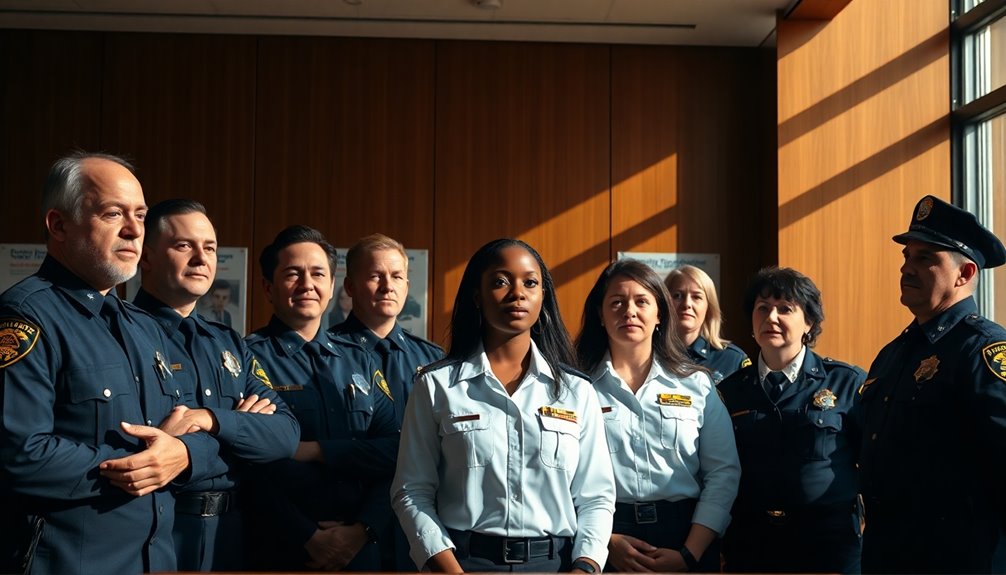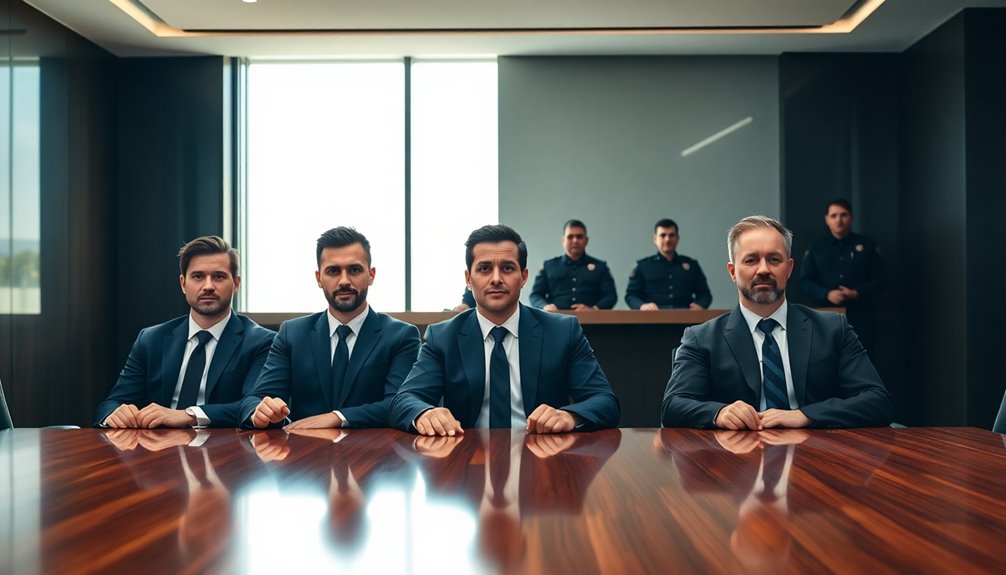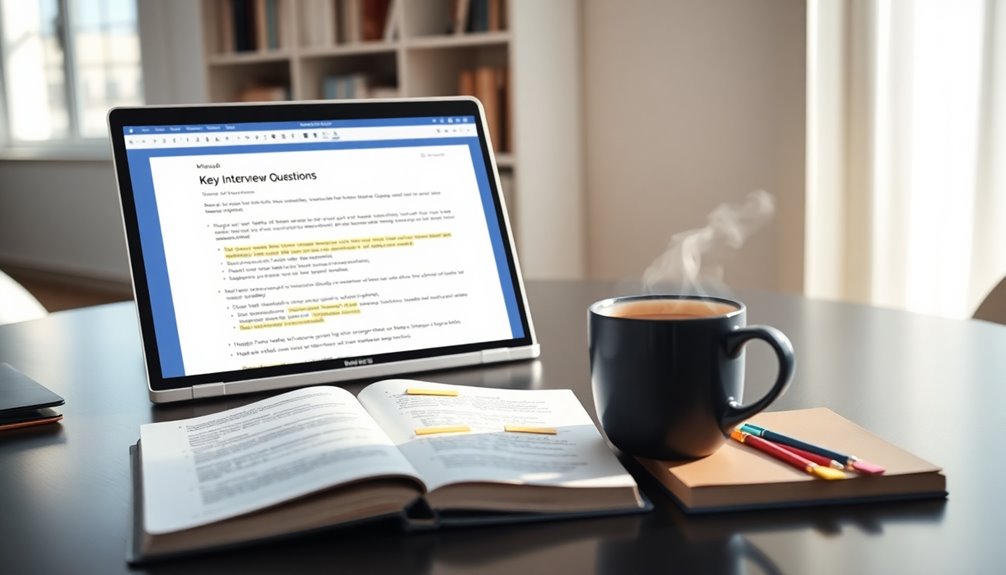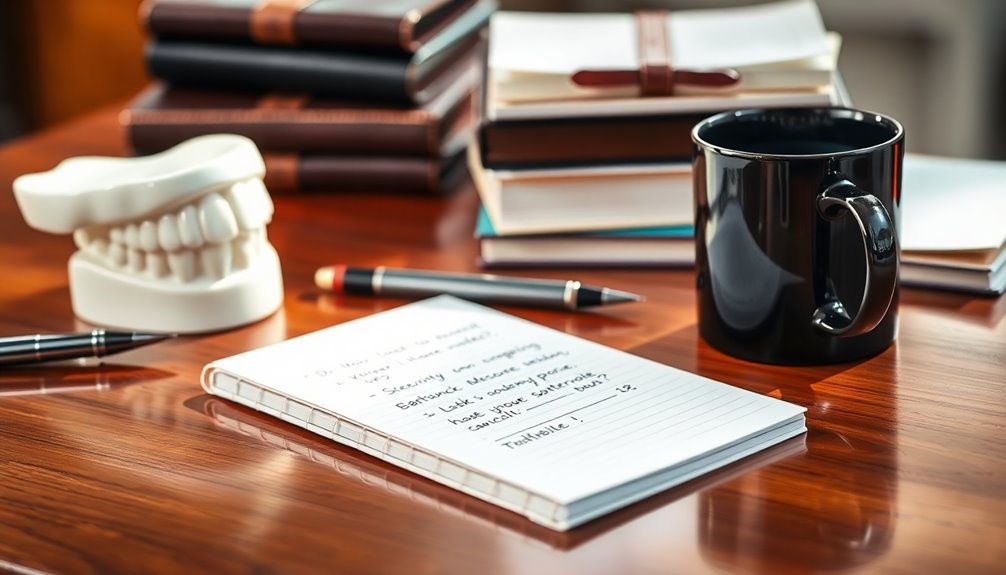To master police oral board interviews with confidence, start by understanding the format and objectives. Key skills like communication, decision-making, and teamwork are assessed, so prepare clear and impactful responses. Research common questions and practice through mock interviews to simulate the experience. Focus on aligning your answers with the department's mission, showcasing your problem-solving abilities, and demonstrating quick thinking under pressure. Pay attention to body language and dress professionally to make a strong impression. By honing these skills, you'll elevate your performance and set yourself up for success. There's much more to explore that can enhance your preparation.
Key Takeaways
- Research common interview questions to build confidence and prepare articulate responses relevant to the role.
- Engage in mock interviews to practice communication skills and receive constructive feedback.
- Align your answers with the department's mission and values to demonstrate fit and commitment.
- Reflect on personal experiences that showcase problem-solving, teamwork, and quick decision-making under pressure.
- Dress professionally and arrive early to convey respect and readiness for the interview.
Understanding Oral Board Interviews

When you step into an oral board interview, you're entering an essential evaluation phase that can determine your future in law enforcement. This meeting typically involves a board of 3-5 members who assess your suitability for a police department position.
The structure usually includes an introduction, a series of questions, and closing remarks. Scoring is important; a score of 70 or above generally means you pass, while a score of 90 or higher greatly boosts your chances of receiving an offer.
Understanding the format and expectations can help you stand out. Prepare to demonstrate your communication skills, decision-making abilities, and alignment with departmental values throughout the process.
Your performance here is a key step in your law enforcement career journey.
Key Interview Objectives

Understanding the key objectives of your police oral board interview is essential for success.
First, you want to demonstrate your communication skills. Clear and effective communication reflects your ability to interact with the community and colleagues.
Next, showcase your alignment with the department's values. They're looking for candidates who embody their mission and goals.
Additionally, be prepared to illustrate your problem-solving abilities. Use examples from your past experiences that highlight quick thinking and sound judgment.
Finally, exhibit your teamwork skills; show that you can collaborate effectively within a diverse group.
Types of Interview Questions

Interview questions during the police oral board are designed to assess various competencies and qualities that are essential for a successful law enforcement career. You'll encounter different types of questions, each focusing on specific areas.
Here's a quick overview:
| Question Type | Focus Area | Examples |
|---|---|---|
| General Interview Questions | Background and motivation | Why do you want to be a police officer? |
| Skills and Abilities Questions | Problem-solving and teamwork | Describe a time you resolved a conflict. |
| Situational Interview Questions | Ethical decision-making and judgment | How would you handle a non-compliant citizen? |
Understanding these categories helps you tailor your responses effectively, showcasing your strengths and suitability for the role. Additionally, demonstrating your ability to manage emotion dysregulation can be advantageous in high-pressure situations.
Effective Interview Preparation

Effective preparation can make a significant difference in your police oral board interview performance. To set yourself up for success, focus on these key strategies:
- Research Common Questions: Familiarize yourself with typical interview questions to feel more confident.
- Engage in Mock Interviews: Practice with friends or mentors to simulate the interview environment and refine your responses.
- Understand the Department's Mission: Align your answers with the department's goals to show your commitment.
Importance of Community Knowledge

Knowing your community is essential when preparing for a police oral board interview, as it demonstrates your commitment to public safety and builds trust with potential employers.
Familiarizing yourself with local leadership, crime trends, and public safety priorities shows you're invested in the area you'll serve. This knowledge not only reflects your dedication but also helps you answer situational questions more effectively.
Understanding community concerns can help you articulate how you'd handle specific scenarios, showcasing your problem-solving abilities.
Additionally, being aware of community resources allows you to present yourself as a proactive candidate, ready to engage with residents.
Ultimately, your community knowledge can set you apart, proving you're the right fit for the department and its mission.
Communicating With Confidence

Confident communication is essential during police oral board interviews, as it helps you convey your thoughts clearly and assertively. To achieve this, focus on the following strategies:
- Maintain eye contact: This shows your engagement and sincerity.
- Use open gestures: Positive body language reinforces your verbal message and creates a connection.
- Practice active listening: Respond thoughtfully to questions, demonstrating your understanding and respect.
When you communicate with confidence, you not only present your qualifications effectively but also establish a rapport with the board.
Common Interview Pitfalls

Many candidates stumble during police oral board interviews due to common pitfalls that can undermine their chances. To help you avoid these traps, here's a quick reference:
| Pitfall | Consequence | Solution |
|---|---|---|
| Lack of preparation | Inability to answer questions | Research and practice thoroughly |
| Speaking negatively | Creates a poor impression | Focus on learning experiences |
| Ignoring body language | Miscommunication of confidence | Maintain eye contact and posture |
| Dressing inappropriately | Shows lack of professionalism | Wear suitable, professional attire |
| Arriving late | Signals disrespect for time | Plan to arrive early |
Resources for Success

Success in police oral board interviews hinges on effective preparation and the right resources. To set yourself up for success, tap into valuable tools that can enhance your readiness.
- Online platforms: Explore websites offering interview tips, sample questions, and best practices tailored to police interviews.
- Mentorship: Connect with experienced officers or trainers who can provide insights, feedback, and encouragement throughout your preparation.
- Workshops: Attend local or virtual workshops focused on interview strategies, body language, and communication skills to build your confidence.
Frequently Asked Questions
What Should I Wear to the Oral Board Interview?
When preparing for your oral board interview, you should wear professional attire that reflects your seriousness about the position.
Opt for a well-fitted suit or blazer, paired with dress pants or a skirt. Stick to neutral colors like navy, gray, or black.
Make sure your shoes are polished and professional. Avoid flashy accessories or strong fragrances.
Dressing appropriately shows respect for the interviewers and demonstrates your commitment to the role.
How Long Does the Oral Board Interview Typically Last?
The oral board interview typically lasts between 30 to 60 minutes.
During this time, you'll engage with the board members through a structured format that includes an introduction, various questions, and closing remarks.
It's crucial to manage your time effectively while answering questions to convey your thoughts clearly.
Make sure you're prepared and confident, as this timeframe allows the board to assess your suitability for the position thoroughly.
Can I Bring Notes to the Interview?
Imagine a compass guiding you through the interview maze. You can bring notes, but they shouldn't become a crutch. Use them as a reference to steer your thoughts, not to read verbatim.
Make certain your notes are concise, so you maintain eye contact and engage with the board. It's about showcasing your knowledge and confidence, not relying solely on paper.
Prepare well, and let your passion shine through.
What Should I Do if I Don't Know an Answer?
If you don't know an answer during the interview, don't panic.
Take a moment to collect your thoughts and respond calmly. You can acknowledge that you're unsure but express your willingness to learn.
It's also okay to relate the question to your experiences or skills, showcasing your problem-solving abilities.
Remember, honesty and a positive attitude can leave a strong impression, demonstrating your potential as a candidate.
Stay confident!
How Soon Will I Hear Back After the Interview?
You might worry about waiting weeks to hear back after your interview, but that's often not the case.
Typically, you'll hear from the board within a few days to a couple of weeks. If you haven't received any communication by then, it's perfectly fine to follow up politely.
This shows your interest in the position and keeps you fresh in their minds.
Stay positive and trust the process; good news might be just around the corner!
Conclusion
In the words of Benjamin Franklin, "By failing to prepare, you are preparing to fail." As you step into your police oral board interview, remember that thorough preparation and self-confidence are your best allies. Embrace the opportunity to showcase your skills, values, and commitment to serving the community. With the right mindset and strategies, you can turn this challenge into a stepping stone toward your law enforcement career. Go in there, and let your passion shine!









